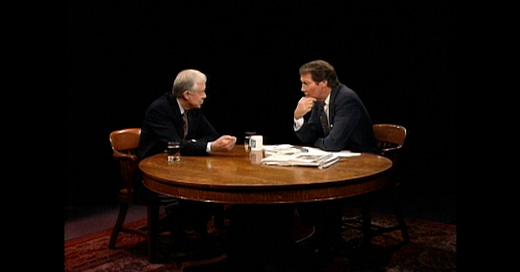March 9, 2023
Jimmy Carter (James Earl Carter, Jr.) served as the 39th President of the United States from 1977-1981. At 98, he is the oldest living former President and has the longest time as a former president. He has spent 42 years in “retirement.”
The Carter Center in Atlanta announced on February 18, 2023, that President Carter would no longer receive medical intervention at the hospital and would spend his final days in hospice care at his home in Plains, Georgia with his wife of 76 years, Rosalyn Carter.
The announcement unleashed waves of tributes on social media and caring statements from many who had witnessed the former President post presidential life long enough to see a re-evaluation of his legacy as President and former President.
There has been no announcement about the exact condition of his health other than his family saying he and Rosalyn were at peace with the decision.
I had a front row seat to the political rise of Jimmy Carter to the presidency as a correspondent for USA PEOPLE AND POLITICS, anchored by Bill Moyers, covering the 1972 campaign.
I first met Carter in 1976 when I went to Georgia to profile Charles Kirbo, Carter’s lawyer. Kirbo was the most important advisor to Carter, as the Naval Academy graduate and nuclear submarine office, returned to Georgia for a life as a peanut farmer/ businessman and politician.
It was an improbable journey from a one term governor of Georgia with little experience in national politics to capturing the Democratic nomination and defeating an incumbent president, Gerald Ford, after the nation had gone through the Watergate crisis and the resignation of President Richard Nixon. Carter campaigned, not as much on issues as on values, saying he would never lie and the country deserved a government as good as its people. Carter defeated Ford and was inaugurated as President on January 20, 1977.
The one term Carter Presidency (1977-1981) was controversial and marked by more international conflict than domestic issues, although critics would site the “misery index” (the unemployment rate+ the inflation rate). Carter lost his reelection to former California Governor Ronald Reagan after a tough primary challenge for the Democratic nomination from Massachusetts Senator, Edward M. Kennedy in 1980 and the aftermath of the Iranian hostage crisis and failed rescue effort.
Jimmy Carter left Washington to 12 years of conservative domination and returned to Plains, Georgia with low approval ratings and an overall negative assessment of his 4 years in office. As a former President, he created the Carter Center in Atlanta, began to write a series of books and travel around the world for human rights and free elections. As the oldest living former President, he has had time to create new legacies and reevaluate old presumptions.
Critics point to the economy, the Iranian hostage crisis and what some call the “malaise” about America’s future. Although attributed to President Carter, he never used the world “malaise” in describing America’s situation.
Supporters and several recent authors have looked at the Carter Presidency more favorably. That includes Stu Eizenstat, an attorney and a former White House staff member, Jonathan Alter, a journalist and author of “His Very Best, A Jimmy Carter, a Life”, and writer Kai Bird, author of “The Outlier: The Unfinished Presidency of Jimmy Carter.” They point to several highlights of the Carter Presidency, especially, the Camp David Peace Agreement between Israel and Egypt and the Panama Canal Treaty, both achieved against heavy odds for failure. There was as well the establishment of full diplomatic relations with China.
Kai Bird wrote in the New York Times: “The man was not what you think. He was tough. He was extremely intimidating. Jimmy Carter was probably the most intelligent, hard working and decent man to have occupied the Oval Office in the 20th Century. Mr. Carter remains the most misunderstood president of the last century.”
Jonathan Alter illustrates Carter’s strength on important issues like the environment and deregulation, his failure on other issues and describes how as a State Senator, Governor and candidate for President, he navigated the racial politics of the region and eventually defeated George Wallace for presidential voters in the South. Carter famously said in his inauguration for Governor in 1971: “the time for racial discrimination is over.”
In consideration of Jimmy Carter, friends and foes recognize that many of his natural qualities like his moral code, his obsession with details, his inability to remain silent on critical issues, and his dislike of political deals, perhaps stood in the way of progress in office, also came to be the human qualities he was admired for around the world. In 2023, those characteristics along with his deep religious faith and “core decency” have given him a kinder assessment. President Carter, while appreciating the global respect and admiration for his post presidency because of his fierce championing of the fight against disease, poverty and human rights around the globe, is also quick to remind readers and audiences of the successes of his one term including the Panama Canal Treaty, the full recognition of China, and the agreement at Camp David the first between between Israel and Egypt.
Jimmy Carter in his post-presidency is recognized around the world for his humanitarian efforts to alleviate poverty, treat disease, and monitor free elections. In 2002, he received the Nobel Peace Prize for his work.




